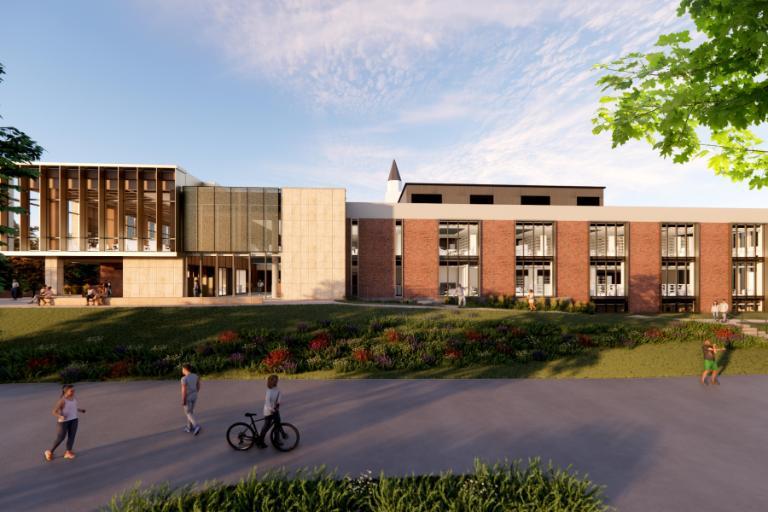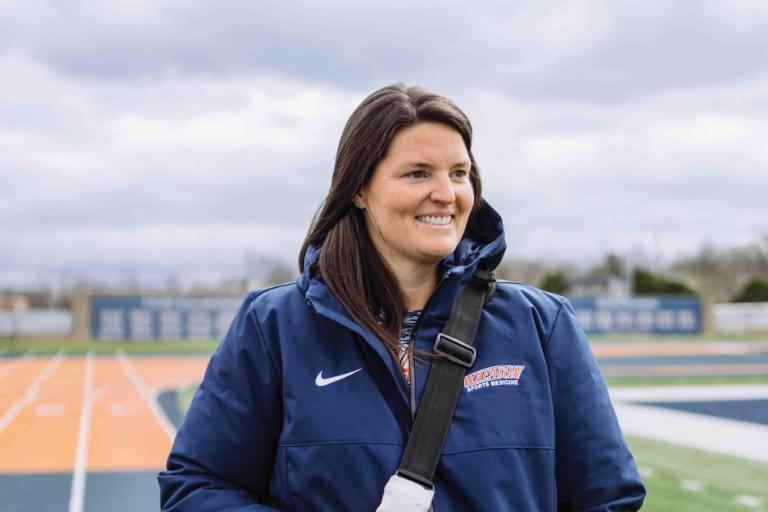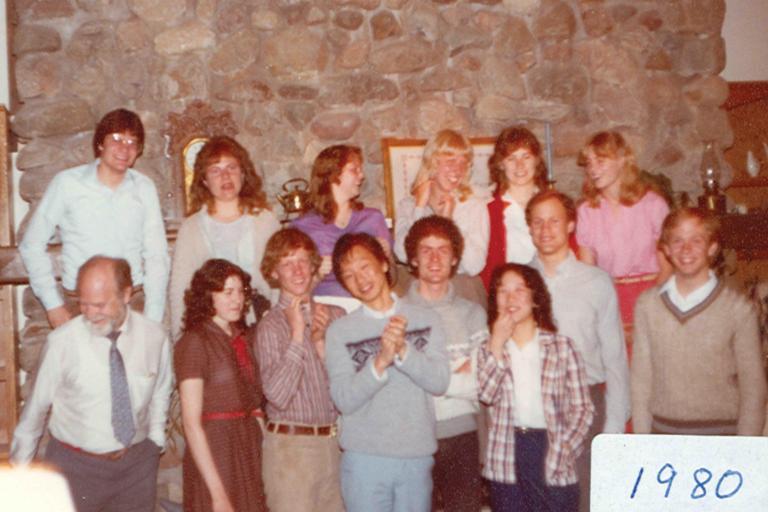How Wheaton’s Psychology, Counseling, and Family Therapy Research Labs Empower Students and Communities
Words: Grace Kenyon ’22
Dr. Sally Schwer Canning says she was called to people first and psychology second. She has been at Wheaton since 1994, working as a licensed clinical and community psychologist and guiding Wheaton students through studies in both clinical psychology and research. Her calling, even before she felt led to conduct psychology research, has been to serve people experiencing poverty in urban settings.
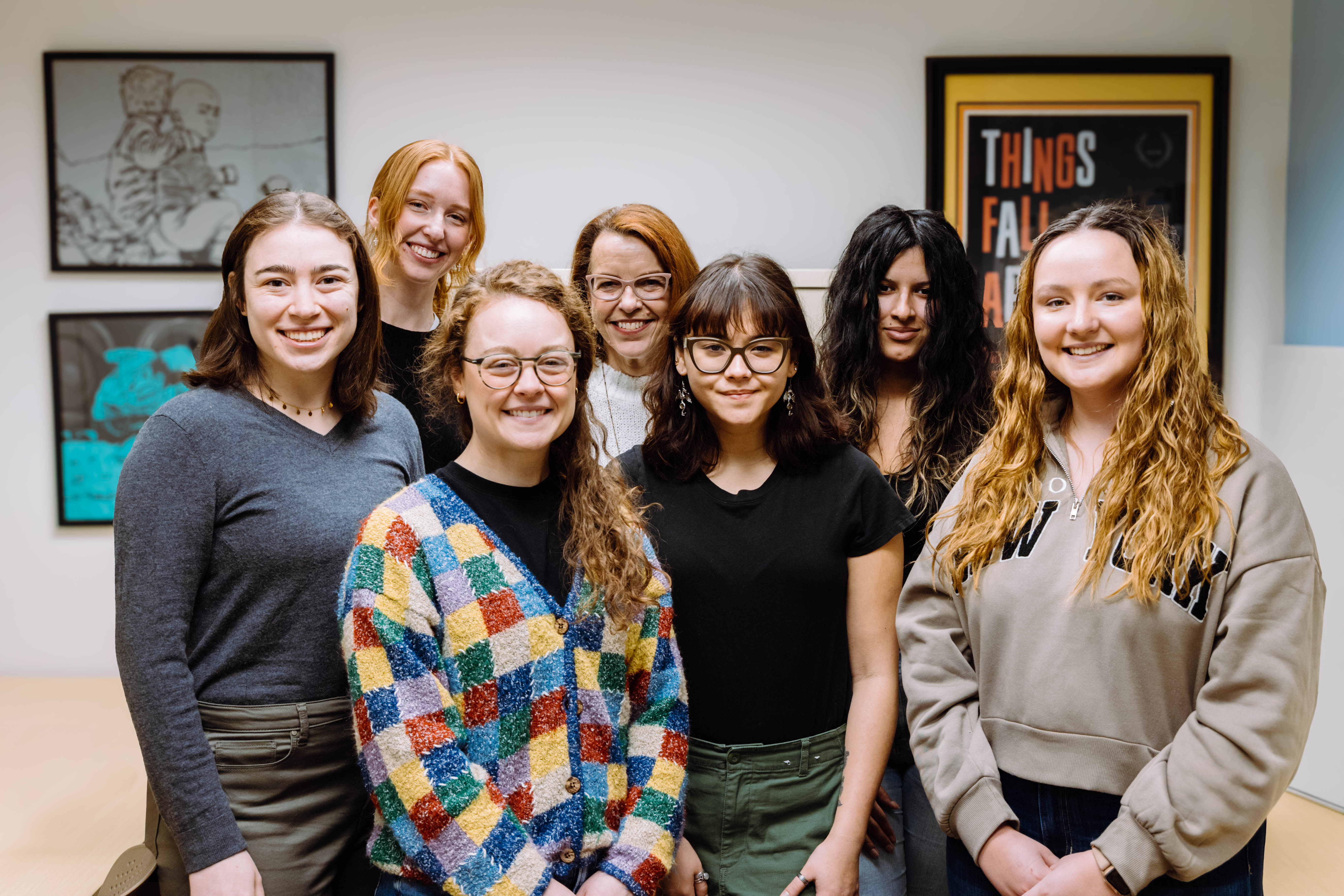
Dr. Sally Schwer Canning (back row, middle) with Urban Community Health Lab doctoral students.
Photo by Kayla Smith
The Urban Community Health Lab is the fruit of that passion. It seeks to support the health and flourishing of families living in poor, urban areas as well as those who serve and work with them. The research Canning conducts in partnership with students seeks to provide both care to underserved populations and research on those who have been historically excluded from, and sometimes harmed by, psychology studies. Two major projects include studying medical providers in an urban primary care clinic system and understanding the experiences of women exiting the sale of sex and opioid addiction in an urban alternative problem-solving court system.
The Urban Community Health Lab is one of six psychology research labs run by faculty in Wheaton College’s School of Psychology, Counseling, and Family Therapy (PCFT). Most students working in these labs are doctoral candidates conducting research as a part of their dissertations. However, undergraduates also have the opportunity to participate in all stages of research, giving them useful and often transformative experiences that direct their career path after Wheaton.
Canning refers to her experience of research as sitting at a table that communities in Chicago have invited her to. God brings students to her lab to fill the empty seats at the table.
“We see who God brings and what they care about, who they’re called to, what they’re called to, and how that fits with the values and needs of the communities we’ve built relationships with,” Canning said. “It’s amazing to see over the years how God brings those students in and how their development as psychologists is informed by their experiences.”
Fostering Real-Life Relationships in the Lab
Dr. John McConnell, co-director of the Multicultural Peace and Justice Collaborative, thinks of his lab as a family. It’s very important to him that his students collaborate and learn from each other.
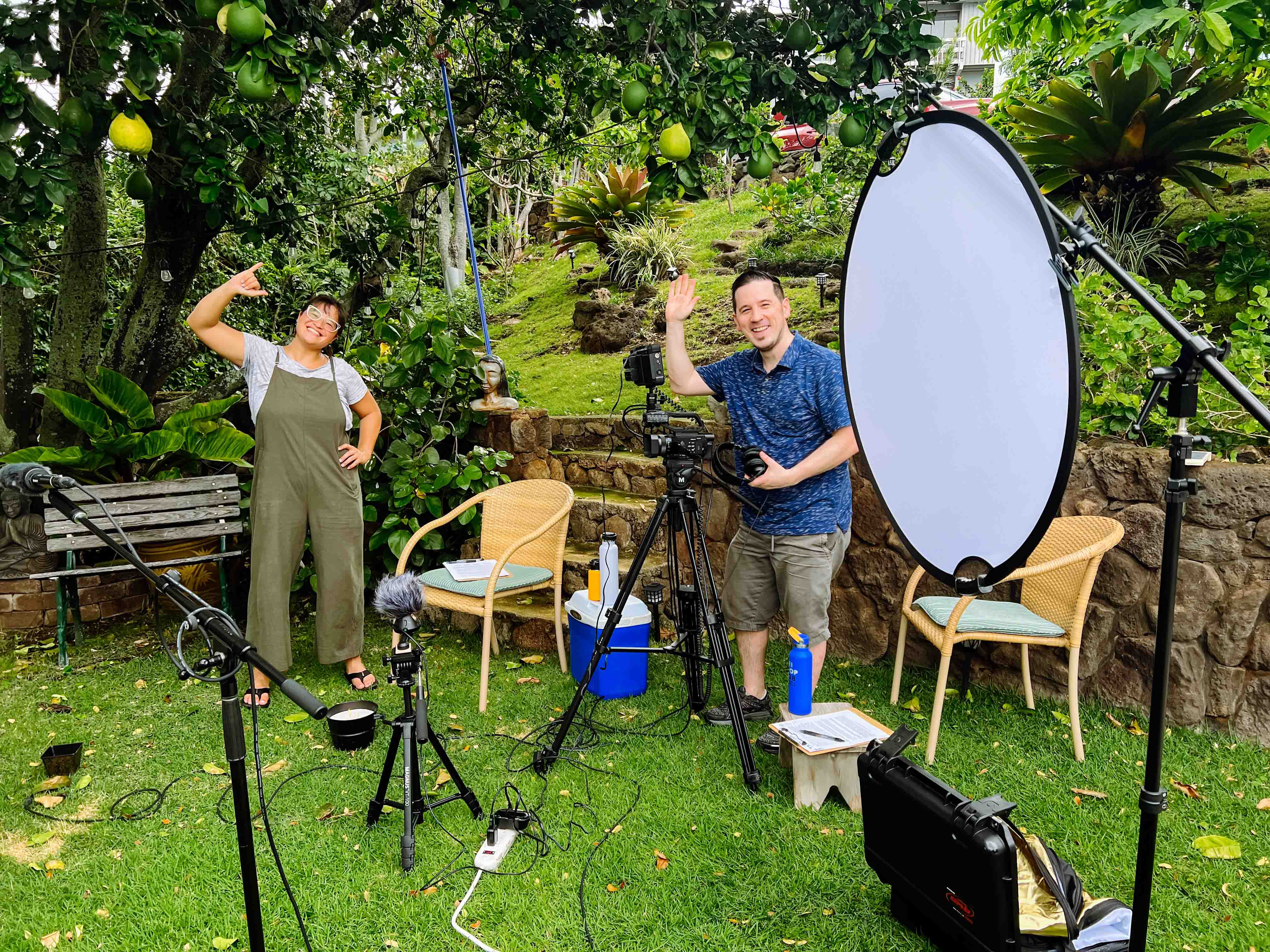
Dr. John McConnell (right) with Carson Tabiolo M.A. ’18, Psy.D. ’21 conducting audio and video work on a recent research trip to Hawaii.
“There are many universities where students are doing their research in silos,” McConnell said. “Whereas I emphasize the social and interactive nature of doing research, not only with the members of the lab but also the people that they’re working alongside in the community.”
The family ethic of the lab extends beyond the research. Researching injustice and working with oppressed individuals is emotionally challenging, and burnout is a present struggle. As such, students need to be cared for in many different aspects of their physical, spiritual, and emotional health. Sometimes, this is as simple as having students over to his house for dinner.
“We have to develop students, not only as people who can do research but who are being changed by the very nature of the topic at hand, and take care of them as they engage with those topics,” McConnell said.
Dr. Sandi Rueger, who runs the Youth Risk and Resilience Lab, works intentionally to include both graduate and undergraduate students in her research labs. Depending on their interests, undergraduates can serve as research assistants or even take leadership to co-author a study. Rueger says she receives positive feedback from students who benefit from the community and mentorship offered by older graduate students.
“It’s a rich environment for undergrads to be able to work with not just faculty but other grad students,” Rueger said. “And what I love about Wheaton is how relationships among students and faculty and staff are lifelong. Those relationships are so precious.”
Rueger’s research is informed by years of clinical practice. After seeing people in her office who had struggled with depression for years, she felt drawn to prevention and early intervention. This is what caused her to focus primarily on youth and strengthening families.
“Adolescence is both a vulnerable time, but also the ideal time to really be focusing on building on strengths and building resilience and trying to work preventatively,” Rueger said. Although her initial research focused on early adolescence, her students’ interests have expanded her work to include later life stages and family systems.
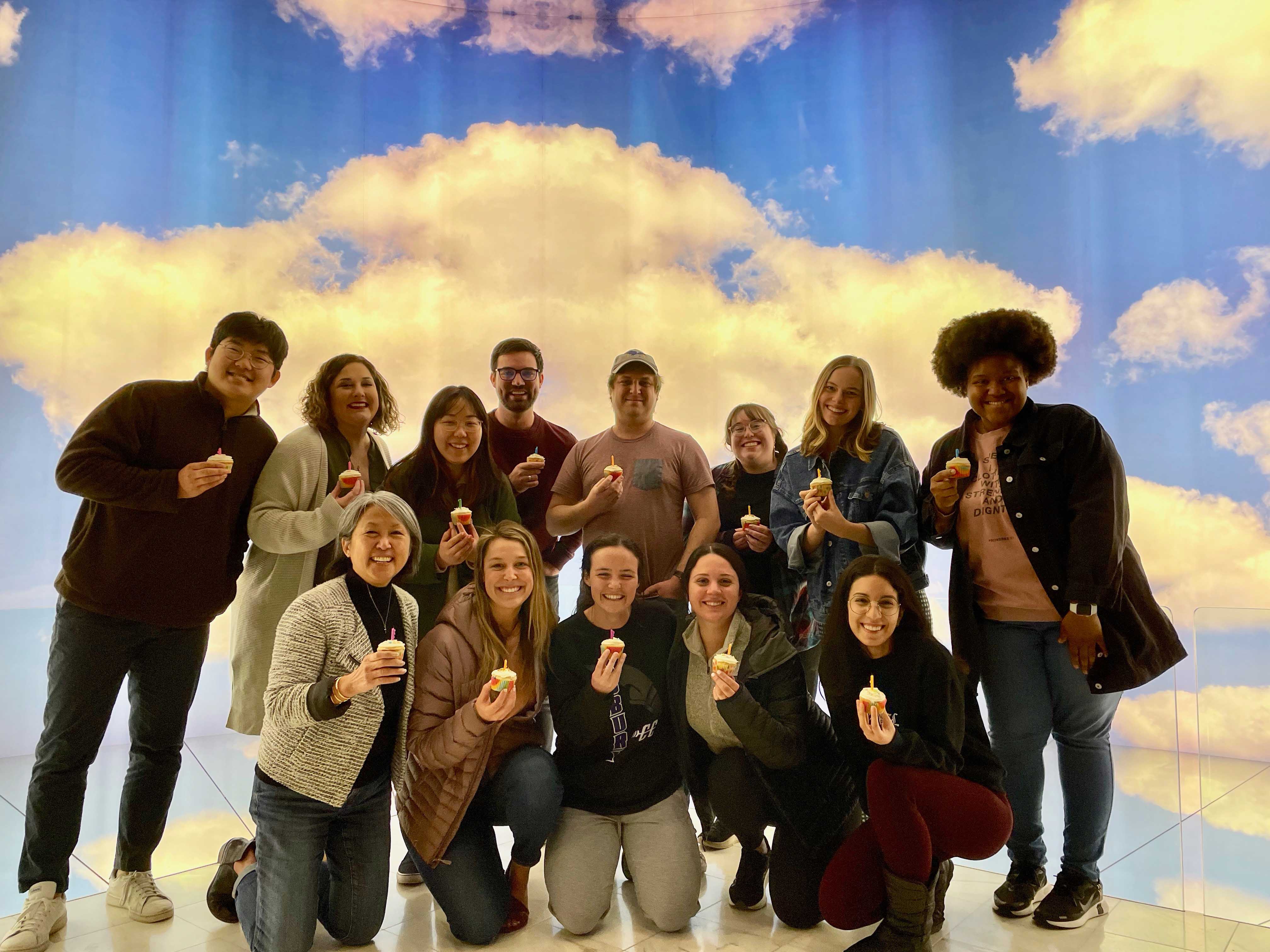
Dr. Sandi Rueger (front row, far left) and students from the Youth Risk and Resilience Lab celebrate class birthdays in the Billy Graham Museum’s “Heaven Room.”
Hannah Regan ’23, who currently works in the Youth Risk and Resilience Lab, has been diligently building her skills—specifically, working on literature reviews to support research projects and verifying data sets. However, relationships have been just as beneficial to her undergraduate experience at Wheaton. The ethos of the lab community surrounding Regan is fueled by the very research they conduct: how social support can protect against depression. So, as Regan looks to discern her next steps, she affirms the lab has given her valuable hands-on experience and confidence in her chosen career path.
“I’m still in a process, but this experience has helped me envision myself going into a doctoral program in the future,” Regan said.
Equipping the Church and Serving the Underserved
One misconception about research is that it reduces people to numbers, says Christina Wong Psy.D. ’26. Although numerical metrics are certainly a common and useful tool (as in quantitative research), it is not the only type of research.
“We don’t have to combine everybody into a number or mean or standard deviation,” Wong said. “Instead, we are actively trying to see the individual, remember them, and honor them.”
This approach has transformed how Wong conducts both research and clinical practice. Wong works in Canning’s Urban Community Health Lab, researching people who feel a sense of calling to work in difficult careers. Her mother works in healthcare, and especially in the pandemic’s aftermath, Wong felt compelled to understand the wellbeing of healthcare workers.
Much of the work that the psychology research labs do is geared toward serving marginalized and underserved populations. In psychology, this can mean populations that lack access to clinical care or populations that are under-researched. For example, Rueger explains that children are underserved in psychological research because most research is done with adults and college students. Other labs focus on Asian American mental health, another under-researched population and topic.
Several of the PCFT labs are also part of a community-facing group called the Mental Health Collective, funded by a generous donor family. These funds and connections enable Wheaton faculty and students to collaborate with local programs aimed at serving churches and communities. For example, one program provides parenting support for families in Chicago neighborhoods where children are vulnerable to poor mental health because of environmental factors. Aimed at preventative care, this program equips parents with tools to connect with their children.
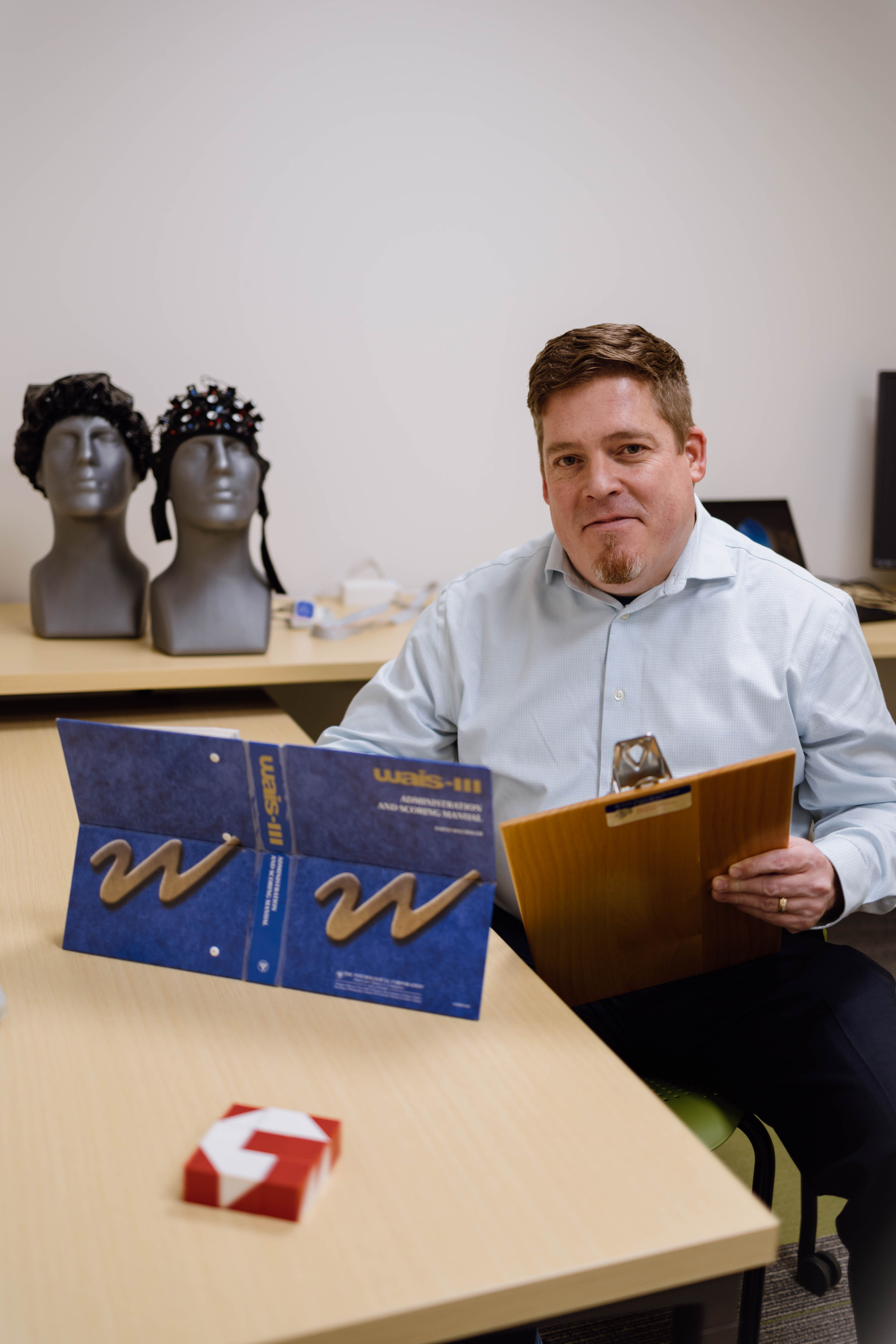
Dr. Ben Pyykkonen with infrared brain sensors (pictured in the background) and other reference materials used in the Neurocognitive Functioning Lab.
Photo by Kayla Smith
Similarly, Dr. Ben Pyykkonen’s clinical neuropsychology research in the Neurocognitive Functioning Lab focuses on increased accessibility to both mental health care and quality neuropsychological assessment services. Clinical neuropsychology emphasizes “assessment,” or methods of evaluating cognitive-behavioral patterns in individuals, which fall into domains such as language, planning, and memory. Effective assessment is critical in informing treatments and interventions administered by clinical psychologists.
Two of his recent research projects covered the impact of chemotherapy on cognition and the effect of momentary stressors on cognitive performance. Pykkonen is particularly excited about a new project that will apply infrared sensors to the scalp to track metabolic activity in the brain. This assessment method has the potential to more accessibly complete tests that typically need to be done with expensive, large machines.
Like the other PCFT labs, Pyykkonen’s work is designed to serve the underserved, including elderly patients or patients who are neurodivergent, such as individuals with ADHD or autism. He also intentionally steers students toward work in areas where neuropsychologists are much needed, like rural regions.
Nathan Palladino Psy.D. ’27, a second-year doctoral student working in the Neurocognitive Functioning Lab, originally became interested in neurocognitive functioning when he went through his own neuropsychological assessment to understand and improve his mental health. Palladino is passionate about research, but he didn’t want to join the rat race of academia just for the sake of adding to his CV. Instead, he sees research as a tool that can be used to advocate for people who experience unique struggles.
“Research can be a tool to not only bring attention to some of the difficult and at times harmful contexts certain groups have experienced but also to bring healing,” Palladino said. “How can we then equip other people—whether the church, parents, spouses, children, brothers, sisters, or friends? How can we help equip people and the person themselves to help them protect themselves and live a flourishing life?”
In addition to equipping churches and families, the PCFT labs aim to bring spirituality into psychology research in meaningful and impactful ways. This effort is headed by Dr. Ward Davis in the Psychology and Spirituality Lab, which strives to advance the scientific study of spirituality to promote health and well-being.
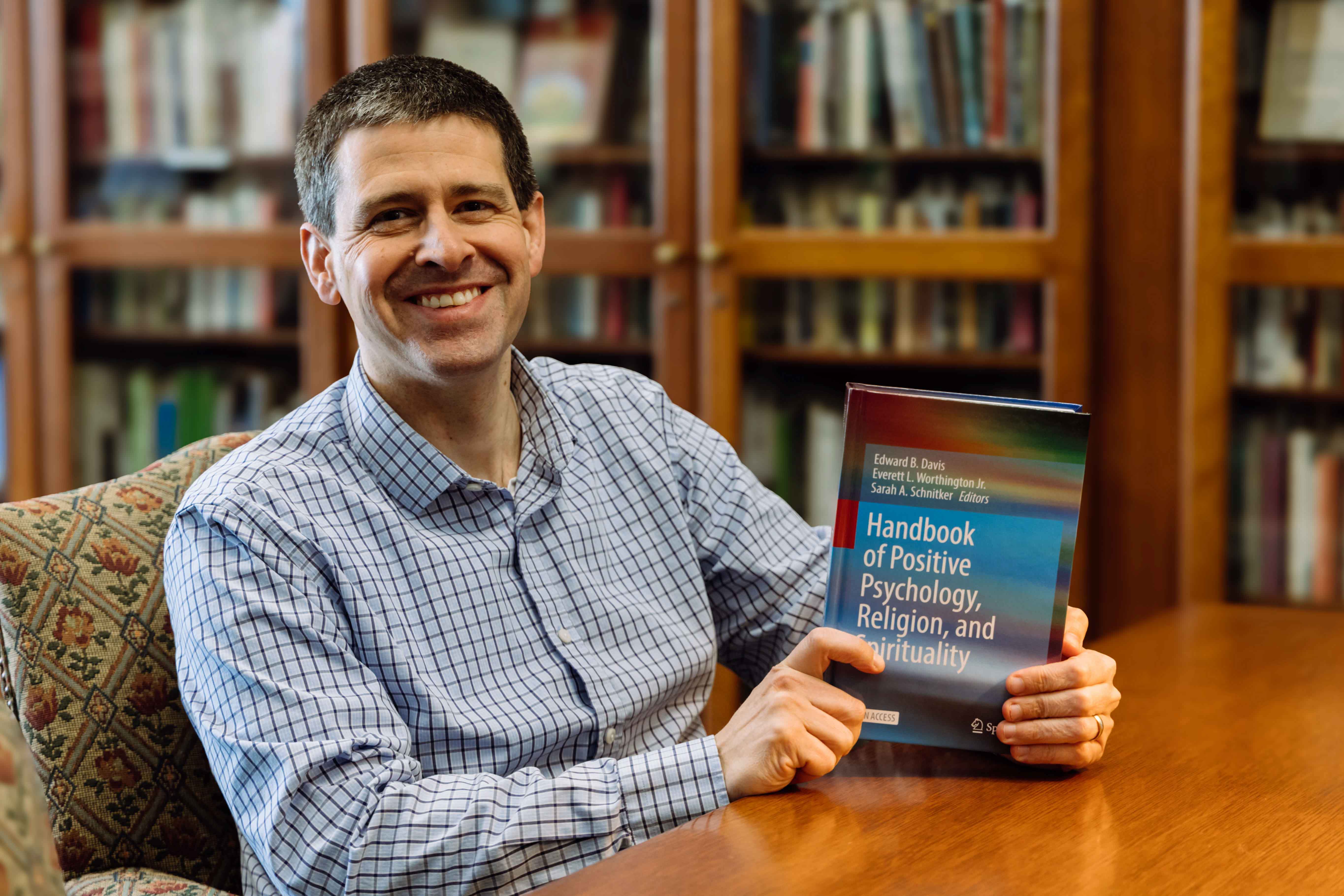
Dr. Ward Davis with the psychology textbook he helped write.
Photo by Kayla Smith
Davis has taught at Wheaton since 2012, studying the intersection of spirituality and psychology through the lens of positive psychology, which he defines as the “scientific study of strengths, virtues, and flourishing.” His lab, in collaboration with researchers at other academic institutions, has developed key resources for psychologists such as the Handbook of Positive Psychology, Religion and Spirituality.
Ezequiel Cruz Gutiérrez Psy.D. ’27 entered Wheaton’s Psy.D. program with the goal of bridging the worlds of spirituality and psychology. Working as a licensed psychologist in Puerto Rico, he noticed a great need for mental health resources in faith communities. He studied religion in college and earned an M.A. in religious education before getting his master’s in counseling psychology, and the pieces of his interests started falling into place.
He now conducts research in the Psychology and Spirituality Lab with Davis. His research aims to help mental health professionals develop “religious and spiritual competencies,” or include sensitivity to spiritual realities in their practice. He hopes to translate this research to the culture and language context of Puerto Rico and to mental health professionals in other Spanish-speaking countries.
Personal Transformation
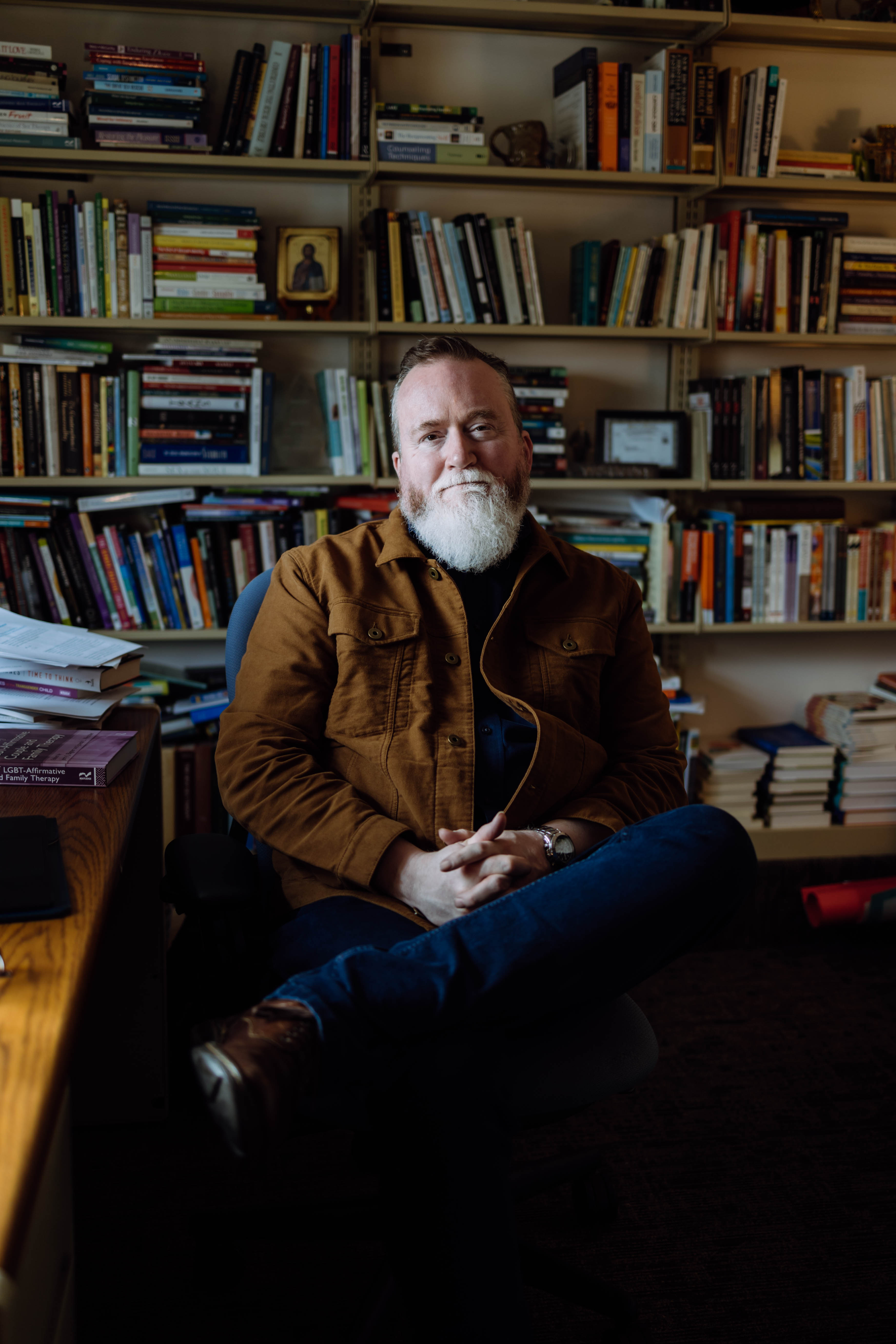
Dr. Mark Yarhouse in his office at Wheaton College.
Photo by Kayla Smith
The Sexual and Gender Identity (SGI) Lab, run by Professor of Psychology Dr. Mark Yarhouse, is housed under the Gender and Sexuality Institute. Yarhouse has been running this institute for 15 years and brought it with him to Wheaton four years ago. The aim of the SGI Lab is to conduct research that explores the relationship between spirituality and sexuality.
One of the lab’s primary goals is to expand collaboration among Christian and public colleges and better understand the experience of sexual or gender minorities on these campuses. In working alongside campuses with different positions on sexuality and gender identity, Yarhouse says they depend on a good network of relationships and trust that they will do their work well.
Yarhouse says that working with the SGI Lab is rewarding for students, not just because of the valuable research experience, but because it helps them engage with gender and sexuality through a Christian worldview and as psychologists.
“It becomes a different angle of entry into the conversation that for them had often only been political or discussed in limited ways,” Yarhouse said. “Working in the lab adds layers of complexity to the conversation.”
Seungju Kim ’23 knew that he wanted to dive into research almost immediately upon arriving at Wheaton. He met with several psychology professors during the fall of his freshman year to ask about their research, and Rueger soon reached out to offer him an opportunity in her lab.
Fast forward to the present day, and Kim will graduate in December having worked in five different research labs at Wheaton and other institutions around the country. This included a partnership faculty at Fuller Theological Seminary through connections with Wheaton professors, as well as an internship at the University of Nebraska and a partnership with faculty at Utah State University that he sought out himself. He is applying to graduate schools and hopes to continue the research he started while at Wheaton.
Most recently, Kim conducted research in the SGI Lab with Yarhouse. Having worked at both secular and Christian institutions, Kim is aware of the complicated relationship between the church and issues related to sexuality. He maintains that the church should lean into the hard conversations.
“I want to push people in that direction of really having more conversations about sexuality and how you integrate faith in that space,” Kim said. At the same time, the psychology research community is also in dire need of a Christ-centered view. “Sometimes wrestling with these tough questions can be perceived as bad,” Kim added. “I think that wrestling is really important.”
In the research community, religiosity is often treated as something that has primarily harmed sexual minorities. However, faith is also a proven resiliency factor in psychological literature. “That’s how people build resilience against hardship, because they’re able to make meaning out of death, meaning out of a broken world,” Kim said.
Whether by engaging in difficult conversations or being invited to learn more about specific mental health struggles, experience in the research labs can be professionally and personally transformative. Palladino, who has an interest in researching sexuality and mental health in addition to his work in the Neurocognitive Functioning lab, notices many small but significant ways his research informs his interactions with patients and other people in his life.
“I have felt more equipped to walk alongside the people I love who are in these spheres,” Palladino said. And this isn’t only a result of the technical information he is learning. He’s even learning from the process of studying and trying to understand people’s experiences.
McConnell believes the PCFT labs’ work plays an essential role within evangelical academia. Sometimes, there can be a rift between psychologists and mainstream Christianity. It is important to McConnell that more students in his lab become passionate about pursuing peace and justice in their communities.
“What I admire most about my students is how their hearts change throughout the research process,” McConnell said. “They become passionate about multicultural peace and justice and passionate about various ways they can engage with the topic. They learn to love research because of what it can do.”

